Note
Recently there's been this trend of rather repetitive and questionable facts about the Tudors on tik tok not to bore you with them all but I keep seeing "Elizabeth and henry knew henry⁸ would be a tyrant" is there any historical backing to this at all?
Hi! No, there really isn't. There's not much documented on the relationship of Elizabeth of York with any of her children as I pointed out here, let alone her youngest son (the claim that Elizabeth of York neglected her queenly duties to be some domestic madonna enshrined in her children's nursery is plain wrong and also harmful to the historical memory of the real Elizabeth). The idea that she kept Prince Henry extraordinarily close to her and that she 'spoilt' him in the process is really much more based on fiction and wishful thinking than facts.
Now about Henry VII's relationship with his son in his last years, I think it had to do more with overprotectiveness about his safety as the only acceptable heir than with 'protecting the world from' him, if that makes sense? Please always take everything you see on tiktok with a massive grain of salt, etc. Hope this helps! x
#Henry VII#Henry VIII#Elizabeth of York#It's also forgetting that for almost all of her motherhood EoY probably never thought of HVIII as a king but as a duke#Arthur was first in line#So maybe HVII had time to have an opinion of H's future kingship#But certainly not Elizabeth
26 notes
·
View notes
Text
“For all the turnmoil and carnage of the fifteenth century, it was not violence that finished off the Woodville family, but an accident of biology: the failure of Jacquetta and Richard’s five adult sons to beget legitimate male heirs. Thus, with the death of Katherine, the story of the Woodvilles became absorbed into the stories of the noble families into which Jacquetta’s and Richard’s daughters married - indeed, into the story of England itself. As their blood became diluted over the years, so too did the sense of the Woodvilles as individuals. They became an amorphous mass, and an unsympathetic one at that as political propaganda, unsubstantiated legend, and myth collected about them. Yet although the Woodvilles, like our own families, shared collective triumphs and tragedies, they were as individual as we are. Even with the blurring effect of time, we can still pick out distinct personalities amid the whole of the Woodvilles: the knight who dared marry a duchess, the widow who captivated a king, the jouster who went to his death wearing a hairshirt, the young knight who charmed Ferdinand and Isabella and who died fighting for a cause not his own, the men and women who quietly went about their daily duties. We should not do them the disservice of forgetting them.”
— Susan Higginbotham - The Woodvilles: The Wars of the Roses and England’s Most Infamous Family.
45 notes
·
View notes
Note
What are your thoughts on Anne's relationship with her uncle, the Duke of Norfolk? Do you think the assumption that they didn't get along is true, or perhaps has been exagerated?
The Duke of Norfolk was among the first and most premiere of the nobility to try to front the queue to be granted properties from the Dissolution in 1536. If Anne and him ever argued, it was probably over that.
If you look at the circumstantial evidence as separated by Chapuys’ spin on it , it doesn’t actually seem like it , does it? His daughter becomes a Duchess due to Anne’s ‘machinations’ and is her premiere lady who carries her train. His mistress is also among Anne’s retinue of ladies.
Retha Warnicke argues against the traditional view of their relationship, in both her biography on Anne and her chapter in Writing Biography: Historians and Their Craft. Granted that’s probably to be expected since she doesn’t rate Chapuys’ as a source (and she goes more in-depth as to why here). The historian Dale Hoak does the same.
What I will say is that their relationship has probably been read backwards, from that last day upon which he’s the grand chair of the jury who condemns her. While this isn’t quite as unfair as her relationship with her father (who condemned the men accused on the other jury, apart from George since he wasn’t a commoner) being judged so; it’s perhaps a bit unfair and due reassessment.
#Anne Boleyn#Henry VIII#Thomas Howard#third duke of Norfolk#He basically let his son get killed in hope of surviving himself#so the fact that he presided the condemnation of his queen isn't proof he didn't get along with her imo#it's just him doing what he needed to do to survive imo
25 notes
·
View notes
Note
Did Henry Tudor restore all Lancaster people's political rights when he ascended the throne (or only his supporters and relatives)? What about the opponents of Richard III (did they just resume their cooperation with him)? How did Edward IV of England's brother-in-law, Anne of York's first husband deal with it? Did his property still go to his wife's second daughter? Does Anne's second husband Thomas have the right to restore political power?
Concerning the remnants of the Lancastrian old guard, he restored everyone he could (ie: everyone who's alive with a clear claim to some estates). the Cliffords and Viscount Beauchamp are not attested on his side at Bosworth but he did restore them for ideological reasons and a quest for support (and also because Oxford was a friend of Beauchamp).
As far as I know, the individuals wronged by Richard III were restored. It's possible some still lost something, considering the 101 people Richard III attainted and the others he wronged, but Henry VII did restore magnates he knew could be more a burden than a help, like Dorset and Buckingham. So I think most were restored. Opponents of Richard III did cooperate with Henry VII for the most part, but he did have some bad surprises with some of them (like with the Household plot).
By 1485, both husbands of Anne of York were dead. I do have some doubts regarding what happened to the Holland inheritance, considering the very shaky claim the St-Légers had on it. I think that Henry VII did reverse Richard III's decision to annul the transmission of the Holland inheritance to Anne, but we know he did break a key part of the arrangement with her betrothal to the son of the marquess of Dorset. I do not know what happened to the Holland inheritance, but Anne Saint-Léger definitely received her mother and the Saint-Léger's lands.
2 notes
·
View notes
Note
Did henry vii's accession to the throne abolish Henry IV's restraint on the beaufort family (or directly declare that he has the right to ascend to the throne)?
De facto it did. But Henry VII never formally rescinded Henry IV's barring of the Beauforts to the throne.
Henry VII didn't want to open a debate and remind everyone of the doubtful nature of his legitimacy. Henry VII's right to the throne is a complicated social construction, in which his Beaufort blood plays an undoubtful part but also his proximity to Henry VI, his marriage to Elizabeth of York, the recognition of his title by Parlement and above all, his victory at Bosworth.
Henry VII didn't want to open a difficult discussion on why he was king. He didn't want to push too hard either a Beaufort legitimacy he had from his living mother or a York legitimacy from his living wife. Recall that for most people, legal niceties such as the legitimacy of the Beaufort claim were quite obscure.
So he claimed the throne in his first Parlement through "right of conquest" as a way to avoid those debates. It allowed him to not discuss the complicated reasons why anti-ricardians chose him as their champion and the compromises he had to make. It's a retrospective claim, made after his victory.
As an aside, not valorizing the Beauforts legitimacy helped him against any pretenders that would use that legitimacy to claim the throne against him. Note that Henry Stafford, duke of Buckingham, owned a copy of Richard II's legitimization of the Beauforts which didn't barred them from royal succession.
Putting forward his triumph at Bosworth valorizes only his legitimacy so to sum it up: Henry VII didn't invalidate Henry IV's decision because he didn't need to and doing so would cause more troubles than benefits. But de facto, one can say that Henry VII's accession invalidated it.
18 notes
·
View notes
Note
The source of Richard III's house arrest of the Countess of Oxford is the petition of her son, the Earl of Oxford. Is the petition of the Earl of Oxford to get back her mother's land?
Well he already got his mother’s lands back. He wanted to make his grip on the lands secure by proving that his mother was coerced. Oxford was an important magnate and close to Henry VII. His heirs probably wouldn’t have this relationship and he wanted that any loss of favor wouldn’t damage his family’s claim to those lands
0 notes
Note
Was Edward IV of England inclined to form an alliance with Burgundy before he married Elizabeth Woodville?
Edward IV of England seems to support Burgundy against the French, and Anthony Woodville escaped in that battle? (other ask)
It seems that Edward IV favoured Burgundy, hence why he eventually rejected the marriage with Bona of Savoy. It's unsure whether he preferred them as soon as the early 1460s. In my opinion, he eventually favored Burgundy because:
France, despite Louis XI's overtures (which started before his ascent) was deeply unpopular in England and the Yorkist regime was quite reliant on pining the Lancastrians as tool of hated foreign powers for legitimacy
More importantly, the French couldn't quite shut down support for the Lancastrians. Henry VI's mother and wife were french, it is complicated for them to completely turn their back on them. Louis XI was forced to put a weird policy of double-dealing as he wanted to seduce Yorkists but couldn't forsake his Tudors and Lancastrian cousins, who were also supported by his Scottish ally.
Allying with France was difficult and unpopular. Allying with Burgundy was simultaneously easier and more attractive, as it opened the possibility of reconquering parts of France. There were pro-Lancastrians forces in Burgundy, including the (much more tenuous) blood relations between the dukes and the house of Lancaster. Still, it was eventually easier to forge an alliance.
Eventually, we talk of 'alliance' but events showed that Edward IV was way less interested in involving himself in continental affairs than simply securing a retreat base if he was overthrown and more importantly, denying his foes such base.
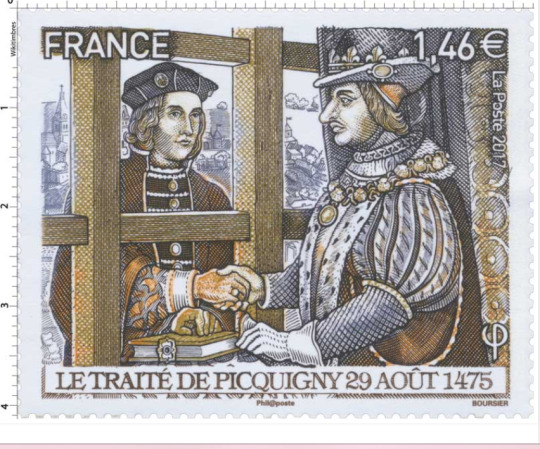
The Treaty of Picquigny showed that Edward IV wasn't much interested in continental conquests, even with a secured England by his side.
4 notes
·
View notes
Text
Recourse to espionage would have been second nature to many of the major protagonists at the opening of the Wars of the Roses as they were conversant with spying techniques employed in the closing ages of the Hundred Years War. While it is conventional to paint Henry VII as the greatest activist in diplomatic and political espionage, I would hesitate: Edward IV awaits exposure as a considerable spymaster. The exigencies of his first reign taught Edward IV the necessity of espionage. When Henry VI and his Queen fled to Scotland Edward built up the Douglases as an English party within Scotland, and gave pensions to the bishops of St Andrews and Aberdeen. He also employed a Scottish merchant William Alaynson and his relations to supply him with political intelligence concerning his enemies, even to flush Henry VI out of Scoltand. At the same time, in the early 1460s, since the Lancastrians threatened to ally with France, he conducted covert diplomacy on the continent [...] Ultimately Edward's life depended on his spies. In 1470 he placed a man in his northern opponents' army. It was this man who warned him that his capture was imminent before he fled to Burgundy.
— Ian Arthurson, Espionage and Intelligence from the Wars of the Roses to the Reformation
17 notes
·
View notes
Note
Regarding the Buckingham rebellion, can you discuss in detail what historians think of as "opportunism at the same time as Yorkton"? I heard it for the first time.
We don't have much idea of what Buckingham's game was. the biggest probability was that he wanted the throne but even accepting this premise doesn't help to fully comprehend his actions between April and November 1483.
For two reasons, Henry Stafford was labelled as an ally of the Woodvilles before 1483. First, he married the queen's sister and second, he participated in Clarence's demise by voting his death sentence. Deposing Edward V means that his marriage with Catherine Woodville becomes worthless. His sons wouldn't be first cousins of the king, and they wouldn't have familial links with privileged access to the Crown. But marital links aren't an absolute guarantee of loyalty and we had precedents of magnates favoring a faction despite their familial links.
Switching side to Richard III makes sense if you want to muddy the succession and slowly put yourself forward. It also makes sense for Buckingham, who won the ear of the new king (who badly needed someone managing Wales and the Marches), a lot of lucrative offices and his hereditary Bohun lands.
What stopped making sense is his 180° switch between July and November in which he contacted rebels and launched a separate uprising. This is very opportunistic behaviour. He basically forsakes the Woodville faction as soon as Edward IV died and then forssakes Richard III as soon as he learns a rebellion was forming. Many historians discussed the reason of this highly opportunistic behaviour. Hicks suggested that he feared that the rebels would kill or marginalize him because the rebellion was so strong. The old tale that he rebelled because he was denied the Bohun lands, which came from Thomas More, is thoroughly debunked. What's left is a want for the crown, which in my opinion, makes the most sense.
So Buckingham did rise on October 1483. The issue is that:
He launched a revolt alone with his retainers. He was joined by no ally from the peerage or the gentry
what little correspondence we have do not tell who he wanted to put as king. He did talk with Henry Tudor but the recognition of his kingship is left at best implicit.
We think he planned to join with Courtenay at Exeter to then rally Henry Tudor. Was it his original plan? Was it to play along with the rebels or simply not to damage his forces by being the first rebel Richard III would confront when he moved south?
His uprising was the most disastrous one. Floods blocked passages through the Severn, his castle was ransacked by the Vaughan and his men quickly abandoned him. As an aside, a magnate isn't some absolute autocrat and retainers would desert an unworthy liege or a liege who switches sides thrice in six months, leaving no explanation for his position other than bad opportunism.
So historians still discuss what were his plans if his position hadn't suddenly collapsed in October. Staying loyal to Henry Tudor? Pushing someone else forward? Pushing himself as king? He overestimated his position. But his rebellion is so odd that Buckingham's uprising is sometimes considered by historians as a separate uprising to the southern-gentry-household uprising in the south, whose motives are clear.
To sum it up, historians still discuss: a) Buckingham's motives, b) his level of coordination with the rebels and c) whether his uprising could be truly included as part of the other uprisings of October 1483 considering it probably didn't share the same motives or the same social force behind it.
As an aside, calling it "Buckingham's rebellion" is quite inaccurate (but not for the reasons Lewis put forward) considering the rebellion was fomenting before he backstabbed Richard III, that his uprising was the weakest and that he didn't plan much of the revolt.
3 notes
·
View notes
Note
What is the intention of the continuation of "Crowland-Chronicle" in writing? It retained the documents ordered to be destroyed by Henry VII, which I think means that chronicles will not be circulated?
It could be anything: a desire to accurately inform, a negative opinion of Edward IV's marriage, an inclusion during Richard III's reign that wasn't removed because of neglect, etc...
0 notes
Note
What if Elizabeth of henry vii and York don't have a son back? Furthermore, what if they don't have children? (Maybe Henry would like the legitimate illegitimate son of the third Duke of Somerset to marry Cecily of York and make him the heir ...)
If he doesn't have kids then it's a disaster to the extent that Henry VII might not survive his reign or might attempt a divorce with Elizabeth of York (or maybe even the reverse). Richard III could have survived Bosworth is his son was alive.
I really don't think he would have promoted Somerset because a bastard of a bastard line don't stand much chance. I think that plan B was shown quite early by Henry VII: he married his uncle to Cecily of York, so I think he would have pushed them or their descent to the throne. The problem is they had none. So after that, speculating that Henry VII is still alive, I think he would have two main choices which are:
Edward Stafford, duke of Buckingham. Pros: rich and a HUGE landowner; prestigious from an ancient line who descent from Edward III through two lines; very connected in the peerage (Percies, Woodvilles, etc...).
The Courtenays because the Earl's son is the only other one who had children with a daughter of Edward IV. Less powerful, less connected but they are still important and they have the Yorkist connection that Edward Stafford lack.
What would Henry VII do? I do not know. It's quite possible he would act like his grandaughter Elizabeth: not chose, and play each faction against the other. So his choice of successor would depend on events. What does Stafford and Courtenay do? On our history, the Courtenays did plot against Henry VII with Edmund de la Pole. Maybe they would openly rebel or, on the contrary, be very loyal to hope Henry VII would name them. The same goes for the de la Poles.
So, we have no idea. Also, what Henry VII decided didn't matter that much after he die. His predecessor and successor made successoral arrangement that weren't respected by political actors.
2 notes
·
View notes
Note
I hate to know some lists of York parties that tried to rescue the prince in the tower and then joined Tudor in exile …
Can you give an example of the Yorkists who defected to Henry Tudor after the crisis in 1483? (other anon ask).
The handiest list of the Yorkist who joined Henry VII is the Wikipedia page of the ill-named Buckingham's rebellion. Some names aren't what I would qualify as 'Yorkist' as Reginald Bray who clearly rebels because Henry Tudor was the son of his liege, Margaret Beaufort, but most of them are Edwardian servants.
We do not know who attempted to rescue the Princes in the Tower in summer 1483. Maybe some of them are on that list, maybe they aren't, we don't know.
But a typical Yorkist rebel could be Giles Daubeney, who's a small landowner in the South-West and esquire of the king's body (basically a mix of courtier and servant and sometimes bodyguard). He rebelled in 1483 very probably at disgust for Richard III's usurpation and the murder of his nephews.
Another one is Robert Willoughby, who was High Sheriff of Cornwall, then High Sheriff of Devon and High Steward of the duchy of Cornwall. He is more dangerous than Daubeney to the extent that he is very connected in the South-West: an already prominent landowner who married an heiress and have a firm institutional position through offices in the duchy of Cornwall who's a major asset of the Crown. His support means a lot.
101 people were attainted at Richard's only parlement. Some of them are Woodvilles, others are connected through familial links to Henry Tudor but most are gentrymen who served Edward IV in the South-West/South-East.
Two aside here:
I'm happy to receive asks but answers will be quite slow/non-existent until march for professional reasons
Buckingham's rebellion is quite ill-named considering his uprising was the weakest, that he was isolated amongst rebels and that historians still speculate on whether it was another uprising with different objectives but opportunistically chose to rise simultaneously with the Edwardian Yorkists.
#war of the roses#Buckingham's rebellion#who really should have another name#Richard III#Edwardian servants
3 notes
·
View notes
Text
Henry Scrope's career in royal service ended unexpectedly on 6 August 1415 when he was executed for high treason in Southampton on the eve of Henry V's Agincourt campaign. His head was dispatched to York and displayed on Micklegate Bar, a particular humiliation since the family held property on Micklegate. Scrope's involvement in the ‘Southampton plot’ has never been fully explained. There were no obvious signs of disaffection towards Henry V, and no evidence that the king was neglecting him. Earlier in 1415 Scrope had made an indenture to serve with the king in France, and in his will he bequeathed to the king an image of the Virgin and asked him to be a good lord to his mother, his wife, and his heir. Scrope's implication in the plot is most likely to have been the result of his close family and financial ties with the other plotters, Richard, earl of Cambridge, Edmund (V) Mortimer, earl of March, and Sir Thomas Grey. Once the plot was discovered he claimed that he had intended to reveal it, but had not done so by the time the earl of March himself betrayed the conspirators to the king. He may, however, have felt that his prospects might improve if the younger and more easily influenced earl of March were on the throne.
Brigette Vale, "Scrope, Henry, third Baron Scrope of Masham (c. 1376–1415)", Oxford Dictionary of National Biography (2004)
#henry scrope lord masham#the southampton plot#henry v#truly a weird plot#maybe they expected March to do the heavy lifting#although I read somewhere they hoped the Percies would become troublesome again#or they probably wanted to murder everybody like the Epiphany plotters considering how limited their resources were
4 notes
·
View notes
Text
The 1403 rebellion bears the hallmarks of a rash and reckless act on the part of Hotspur. Before the rebellion itself, Percy's dream of establishing his Anglo-Scottish lordship was for the first time a real possibility and it is difficult to imagine that the old campaigner would abandon that for which he had consistently worked over several decades, to suddenly attack his king. Yes, he had helped remove Richard II from the throne, but the situations were radically different. In 1399, Percy had been part of a broadly based coalition moving with great force and purpose against a massively unpopular monarch who was no great friend of the Percy family. In 1403 however, the forces that met Henry at Shrewsbury were a hastily cobbled together,`ramshackle' army drawn almost exclusively from one county, and whose allegiance was based upon the lie that Richard II was about to return.
The rebellion was the brainchild of Hotspur. It is difficult to imagine Percy planning, or even approving of, such a scheme. In the summer of 1403, he had far too much to lose. Hotspur did as well, but he seemed not to have recognised that fact. That the 1403 rebellion was Hotspur's scheme also accounted for the frankly bizarre timing of Percy's movement south. If he had stayed in the north as part of the plan for the rebellion, in order to guard the marches, as has been suggested, then why wander down into Yorkshire some days after the battle had taken place? If the campaign had been well planned, one would expect that Percy would have either stayed in the north to guard the march, or moved south at the same time as Hotspur in order to support his forces, and not simply get caught in between. Hotspur's movement south was reminiscent in its recklessness of his actions at Otterburn, and the late movement south by Percy suggested that he, as well as the king, had been taken by surprise by his own son's actions.
Kris Towson, "Henry Percy, first earl of Northumberland: ambition, conflict and cooperation in late mediaeval England" (PhD thesis, 2005)
#henry hotspur percy#henry percy 1st earl of northumberland#thomas percy 1st earl of worcester#battle of shrewsbury#the percy rebellion#thomas owed A LOT to Richard II#imo Henry simply failed for X reason to join his son#and btw I don’t see the ‘impulse’ side in the rebellion#it was swift#as to make sure Henry IV couldn’t muster all his allies#but Hoptsur did manage to ally with other nobles and rally his uncle#so it was prepared a bit#IMO he wanted to rush into Cheshire/wales to broaden his revolt before Henry IV stop him
3 notes
·
View notes
Photo

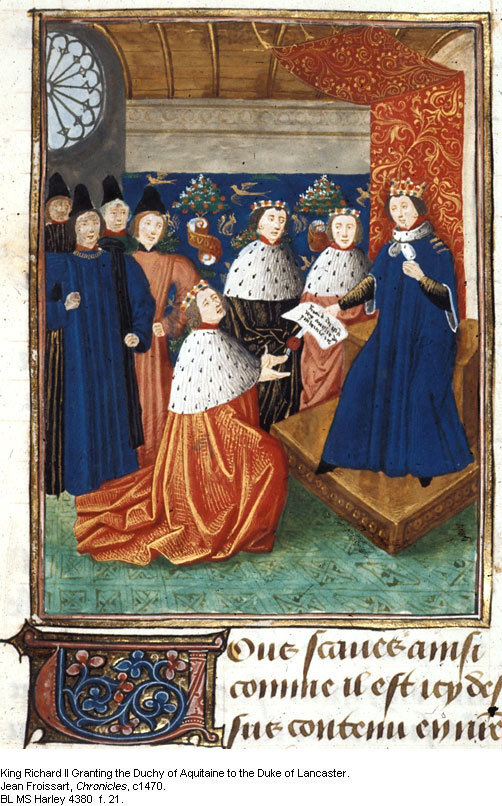

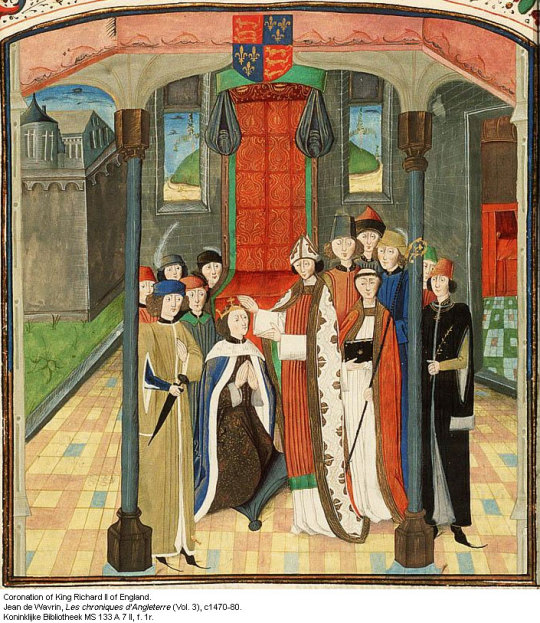
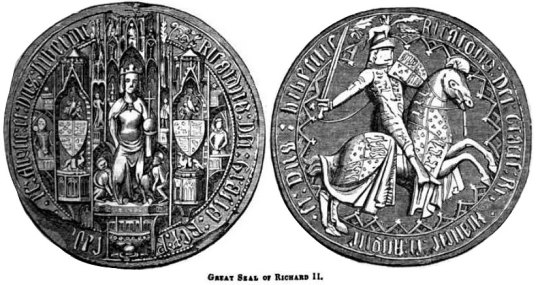
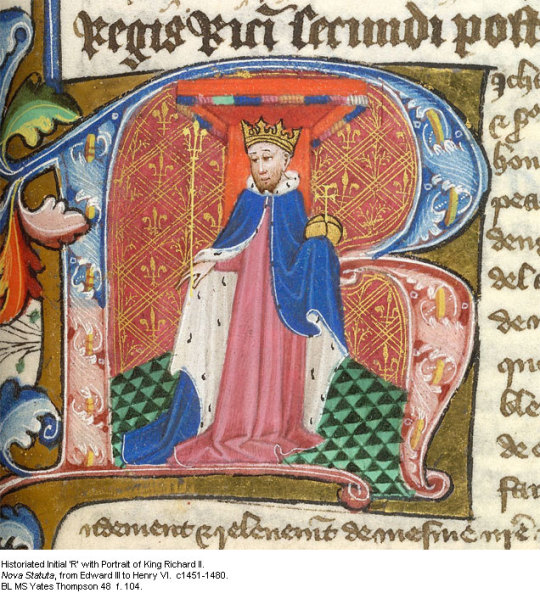


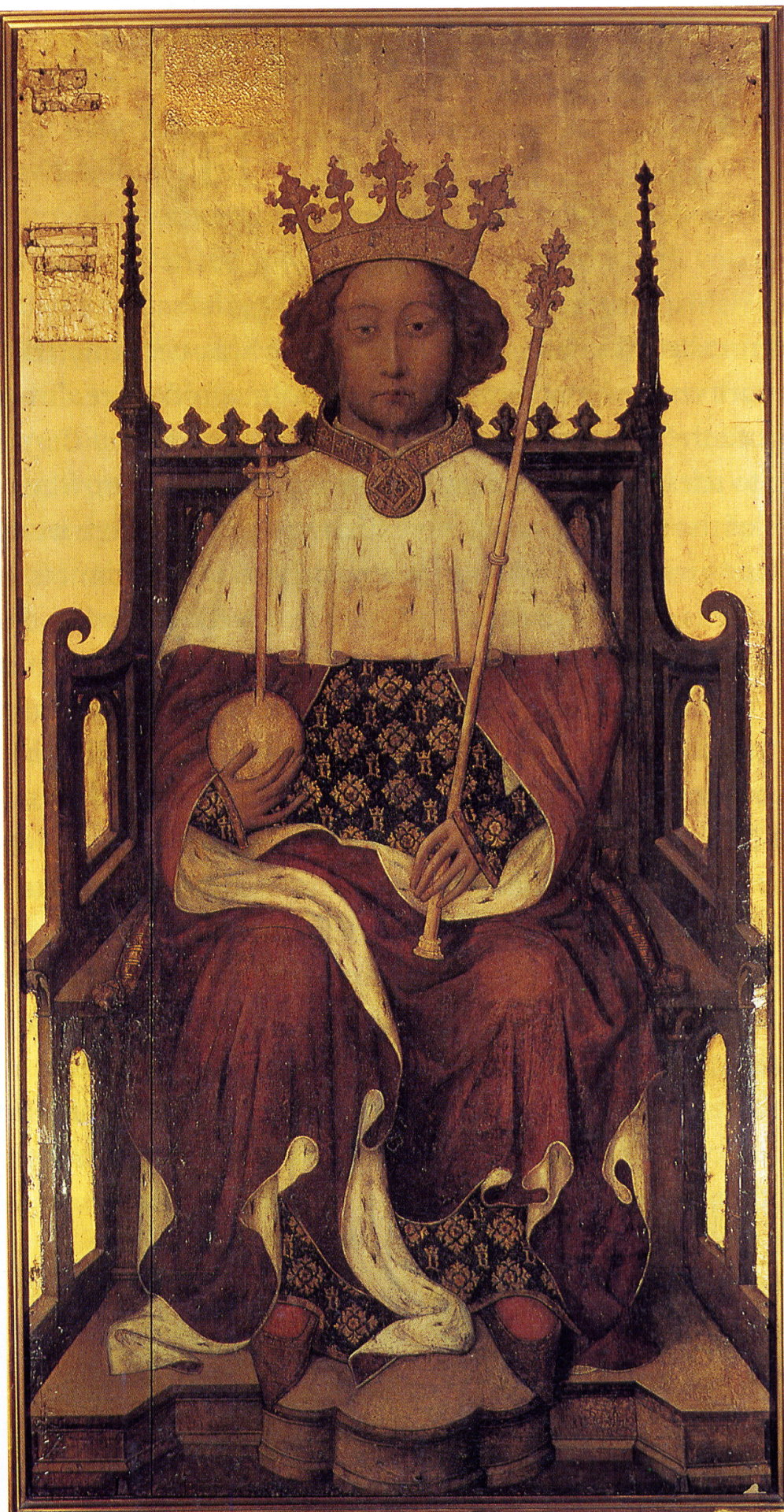

Today in History:
On this day in 1367, Richard of the House of Plantagenet was born in Bordeaux, France, to Joan of Kent and her husband, the Prince of Wales Edward, known to history as “The Black Prince”. When Richard was born on Twelfth Night, or the Day of Three Kings, three kings were visiting his father (the King of Castille, the King of Navarre and the King of Portugal were, according to contemporary sources, present at his birth [1]). This anecdote, and the fact that his birth fell on the feast of Epiphany, was used by later chroniclers to draw similarities between the birth of Richard, then King of England, and the nativity of the Christ child.
Because of the wonderful love I feel for the good King Richard, please enjoy (or pardon) the flood of photos above.
Happy birthday, Richard!
189 notes
·
View notes
Text
Henry’s first battle may have had lasting effects which went beyond those of a very severe, and no doubt very traumatic, physical injury. There may have been lasting neurological damage. His potentially fatal wounding, and near escape from death, at Shrewsbury in July 1403 may have had longer-term effects. That closeness to mortality may have made him more than normally aware, for his time, of his state of health. The high risks involved in campaigning, not only of death in battle, may have led him to make three wills, each on the eve of his departure to France. It was, after all, of illness on campaign, not from ‘active service’, that he was to die.
Malcolm Vale, Henry V: The Conscience of a King (Yale University Press, 2016)
#henry v#shrewsbury wound#battle of shrewsbury#it would be interesting to know how he confronted risks in his later campaigns
12 notes
·
View notes
Text
[Henry V's] experience of battle at Shrewsbury might also have made Henry especially conscious of the plight of those who suffered in war. In November 1413, for example, he granted Thomas Huntley and his wife Agnes a pension of 8d per day for the term of their lives, drawn on revenues in Essex and Hertfordshire. Thomas had, like the king himself, been wounded at Shrewsbury and ‘could not earn his living, nor did he have anything on which to live, as it is said’. Later in the reign, the king had made provision for those left wounded and deprived of sufficient means by their service in his French war. Shortly after his death, it was recorded that he had given sums of money ‘at various times’ to ‘certain soldiers, wounded [mutulatis] in the king’s service, and reduced to poverty through the weakness of their bodies’.His executors discharged their duties and cleared the debts thus incurred. Les Invalides (founded in 1670) and Chelsea Hospital (founded in 1682) clearly had precedents, if less institutionalised ones.
Malcolm Vale, Henry V: The Conscience of a King (Yale University Press, 2016)
8 notes
·
View notes